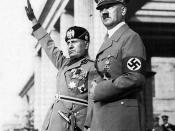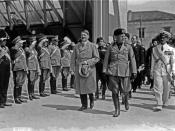Fascism in Germany and Italy
Many similarities exist between German fascism, or Nazism, and Italian fascism. For example, both fascist movements were brought into power after facing very similar problems. One of the major problems that both countries encountered was a post-war economy teeming with instability. Germany's fragile economy was undermined by widespread unemployment, hyperinflation, and burdensome reparation payments, while Italy's economy was just as delicate. In addition, the Great Depression brought both countries even further into economic collapse. Another problem that brought about fascism in the two countries was post-war peace settlements, especially the Versailles Treaty. While the Germans were exasperated by the exorbitant reparation payments forced upon them by the Allies, the Italians felt betrayed by the peace settlements for denying them the territory and status they deserved. Another problem that the two countries faced was their dissatisfaction with their existing governments. Many Germans were disgruntled with the Weimar Republic for signing the humiliating Treat of Versailles, while many Italians were apprehensive of the chaos within their parliamentary regime.
Lastly, widespread fear of revolutionary upheaval and the expropriations of a Communism system also caused many Germans and Italians to identify with fascism.
Both German fascism, led by Adolf Hitler and Italian fascism, led by Benito Mussolini exploited many economical and political difficulties within their nation in order to gain power. Hitler blamed Germany's ruined economy on the Weimar Republic, Communists, and Jews, while Mussolini blamed large Socialist and Catholic parties for Italy's economic struggles. They also gained the support of farmers, small businessmen, civil servants, and young people by advocating strict nationalistic goals and blaming their economic troubles on the Bolsheviks. Nevertheless, the most crucial components of securing political power was though institutionalized violence and the abolishment of all other political parties. The fascist party under...



Fascism in Germany and Italy (compare and contrast)
A pretty good compare and contrast essay. A few sentences need to be fixed...sentence structure was a little akward. But other than that, good job. (I can't comment on the truth of this, since I know nothing about the subject)
2 out of 2 people found this comment useful.